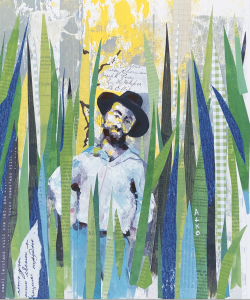Poet, Philosopher, and Freethinking Revolutionary

One man filled this position from the bottom of his boot soles to the brim of his cocked hat. That was the immortal spirit and man, Walt Whitman. In terms of his poetry, not only was he regarded as America’s greatest writer of verse, but as America incarnate, the very soul of this country. However, he mentions, “ I often reflect, how very different every fellow must have been from the fellow we come upon in myths.”
Yet, just as intriguing is that Walt Whitman sought his identity in the joyful musical cadences of science as seen in his poetry from his great compilation, “Leaves of Grass.” “And what I shall assume, you shall assume, for every atom belonging to me as good belongs to you.” With these words he genuflected his regard that as Americans, we are all gifted the same freedoms as much as the same air that we breath and the same land upon which we live. That was his inherent baseline.
The dreams of the possibilities of man, especially in solidarity were thoughts his mind could conceive of without doubt. “Solidarity: where else can one produce it’s substitute? This is the largest word in resources….fullest of meaning potential, all inclusive.” This was said much in the same way his contemporary, Abraham Lincoln, felt about the equality of all men no matter their color, race or creed.
With an optimistic nature, Whitman celebrates a single leaf of grass which, “is no less the journey work of stars.” And with these succinct depictions spoken by the man, we can begin to taste the journey that Walt Whitman was on beginning with his birth on May 31st, 1819 through his death March 26th, 1892 and forever after.
He blew away the structured verse of bygone days. This was nurtured by his life of the many freedoms that the new world offered. The recollected highlights of his life included bathing fully naked in nature, basking in the glories of the sea and land under the sun and stars.
Walt Whitman believed himself as infinite as an artist, because he saw that he lived in his art rather than life itself alone, with no beginning and no end. He was also a complete free spirit, possibly one of the very first, since the white man arrived on the shores of the continent. Hedged up against the puritanical values of earlier times, Walt was fortunately born into a Quaker abiding family who didn’t force their views upon him. Thus, he was free to carve out his on unique religious path as he saw fit. Regarding his creativity, he believed, “In all imaginative work…there must especially come in a primal quality…the fervor of genuine spirit.”
The second of nine children, Whitman’s family had very little education and were primarily farm folk. At about ten years of age, his formal education came to an end due to financial hardship. He began to live and work in the city of Brooklyn, learning the printing trade and teaching on and off again to help support his family.
As a result of his free-spirited even rebellious nature, he was not able to hold down a job for very long nor was he able to reside in the same place for any extended period of time. However, on the other side of the coin, he developed and was considered to be the father of free verse as seen in his poetry and philosophical diatribes. He blew away the structured verse of bygone days. This was nurtured by his life of the many freedoms that the new world offered. The recollected highlights of his life included bathing fully naked in nature, basking in the glories of the sea and land under the sun and stars. He went along his merry way making bold pronouncements for the time such as, “ One day sex will be revered in all its glory and respect that it deserves.” At six feet tall and of a burly size, he was very strong, husky and handsome to both men and women. Although he hints at having physical relations with both genders, he made sure to fully edit many secrets of his life. Who he had affairs with and what actually went on between he and his lovers would remain in the privacy of his heart and mind for all eternity.
Lastly, in part one of this biographical study, I would like to mention that Whitman set up his life in such a way so that he had none of the responsibilities that ordinary people had. He had no spouse, children or home to look after. People’s average worries and concerns did not take a foothold in his life. Instead he lived for moments of intellectual and spiritual breakthroughs and insights. Several recorded examples are bright moments of glory such as, “I swear to you; there are divine things more beautiful than words can tell.” or “Every hour of the day is a perfect miracle.” Throughout his life he luxuriated in a sense of endless time, free love and rebelling against the status quo of being a family man. All of this contributed to a life lived above the fray. He aimed high as a result in his purpose on earth and that was to be an honorable protector of the arc of this nation. To protect and defend the conscience of this country as set up by the founding fathers. This was the combination of agreed upon philosophies of man’s place in the universe and the laws that will protect the truths of this land for each successive generation to come.
